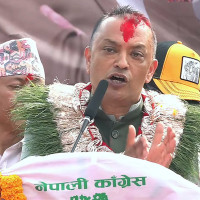- Friday, 27 February 2026
Revenue collection fails to foot even recurrent expenditure bill
By A Staff Reporter,Kathmandu, Dec. 18: Revenue collection has been less than government expenditure during the first five months of the current fiscal year 2022/23.
According to the data of the Financial Comptroller General Office, the recurrent expenditure of the government is recorded higher than revenue collection in the first five months of the current fiscal year.
The revenue collection is 23.48 per cent of the annual targe while the recurrent expenditure (administrative expenditure) has reached 30.22 per cent.
The country is facing a revenue deficit for the first time this fiscal year. The revenue collection of the government stood at Rs. 329.46 billion while recurrent expenditure stood at Rs. 357.5 billion by December 16, 2022.
Around Rs. 303.9 billion has been raised from the tax revenue and Rs. 25.4 billion from non-tax revenue during the review period.
The government has set a target to collect revenue of Rs. 1,403.1 billion. The government had allocated Rs. 1,183.2 billion in the heading of recurrent expenditure for the last fiscal year.
The government's tax revenue collection is 23.46 per cent (Rs. 303.9 billion) of the target while non-tax revenue collection is 23.66 per cent (Rs. 25.4 billion).
Economist Dr. Chandra Mani Adhikari said that when the government imposed a ban on the import of various goods because of the decrease in foreign exchange reserves, there was a big impact on the economy, especially in revenue collection.
Due to lack of foreign currency reserves and liquidity, the government had banned the import of various goods from April 26, 2022. But the government has recently lifted the restriction on the import of these goods.
The total budget expenditure of the government was Rs. 438.7 billion, which is 24.46 per cent of the total allocated budget. The government had allocated a budget of Rs. 1,793.8 billion for the current fiscal year.
Capital expenditure amounts only 9% During the review period, the capital expenditure of the government has remained low. The capital expenditure stood only at 9 per cent of total allocation during the five months of the current fiscal year.
Of the Rs. 380.3 billion allocated under capital expenditure, only Rs. 34.2 billion has been spent so far. Similarly, out of the Rs. 230.3 billion allocated for financial management, only 20.4 per cent (Rs. 46.9 million) has been spent, according to statistics.
Economist Dr. Adhikari said that the rate of capital expenditure at the end of five months of the fiscal year was very poor. He, however, said that it was not something new, but the government has never thought of identifying the weaknesses, hindering the capital expenditure capacity.
The rate of capital expenditure is low even after five months of the current fiscal year which indicates that the government failed to expedite development works rapidly even when the budget was unveiled in time, he said.
As capital budget is the source of economic development, in a country like Nepal, there will be low capital budget allocation and because that too will not be spent, economic development and high economic growth will not be possible to achieve.
"Low rate of capital expenditure is a challenge for the country and the government too. This is because of the fact that the government and the concerned authorities failed to carry out works making a calendar," he said.
He said that the government should make concerned bodies responsible for accelerating the rate of capital expenditure. Adhikari said that not only is the capital expenditure low, but for the first time in this fiscal year, there is a revenue deficit, which is another challenge for the country's economy.






-original-thumb.jpg)









